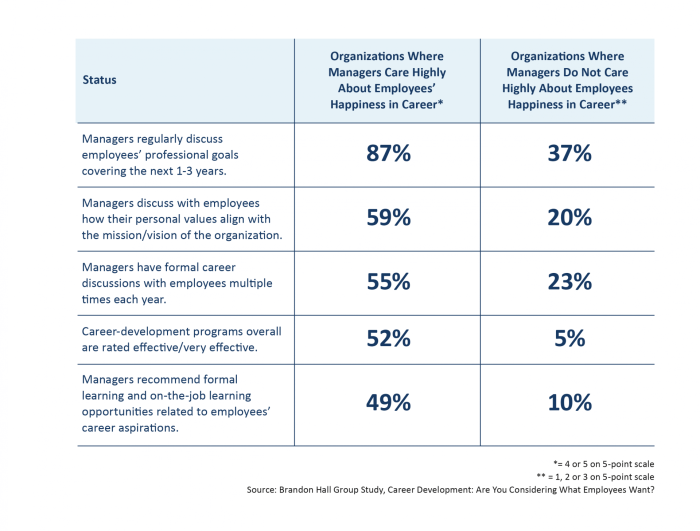Forget the “climb the ladder” advice – that’s so last decade! We’re talking about building a career that’s as awesome as your favorite band’s latest album, a career that’s all about YOU and what makes you tick. This ain’t just about the paycheck, it’s about living your truth and doing work that makes your soul sing.
We’re diving deep into the world of values, because let’s be real, your values are like the lyrics to your life song. They’re what make you unique and guide you to a career that’s a perfect fit, not just a random gig.
We’ll explore how to identify your values, craft a career strategy that aligns with them, and make decisions that keep you true to yourself – even when the pressure’s on.
Defining Your Values
Think of your values as your personal compass, guiding you towards a fulfilling and meaningful career. Identifying your core values is crucial for aligning your work with your passions, leading to increased job satisfaction and a sense of purpose.
Understanding Your Values
Your values are the principles that guide your decisions and actions. They represent what’s important to you in life, and they influence your career aspirations. These values can be as diverse as creativity, independence, helping others, or financial security.
To identify your core values, consider the following:
- Reflect on your past experiences:What have you enjoyed most in your previous jobs or volunteer activities? What aspects of your life bring you the greatest satisfaction?
- Think about your goals:What are you striving for in your career? What kind of impact do you want to make? What kind of lifestyle do you envision?
- Ask yourself:What are your priorities in life? What are you willing to sacrifice for your career? What are your non-negotiables?
Once you’ve identified your core values, you can start to align your career aspirations with them. For example, if you value creativity and autonomy, you might pursue a career in the arts or entrepreneurship. If you value helping others, you might consider a career in healthcare or social work.
Crafting Your Career Strategy
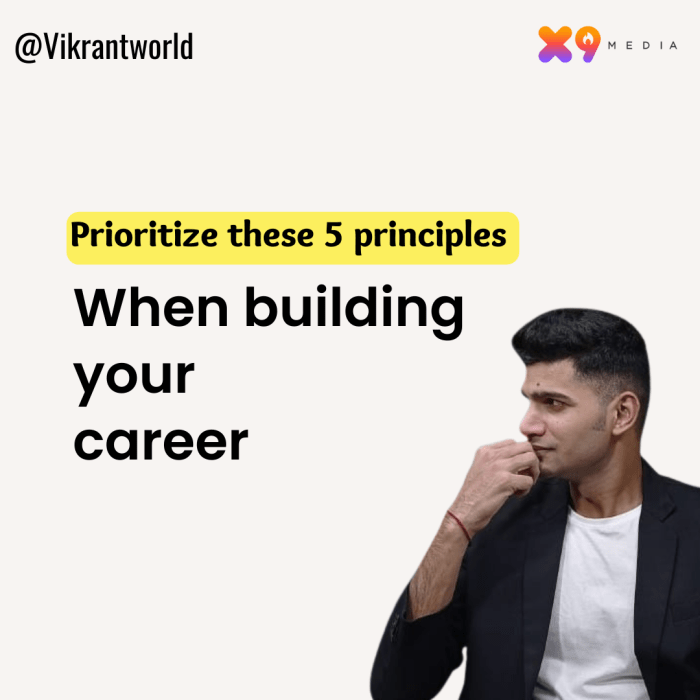
Now that you’ve got a clear understanding of your values, it’s time to turn those into a concrete plan for your career. Think of it like building a house: you need a blueprint before you can start laying bricks. This is where crafting a career strategy comes in.
Designing Your Career Roadmap
A career roadmap is a visual representation of your professional journey. It helps you map out your long-term goals and the steps you need to take to achieve them. Here’s how to create one that aligns with your values:* Start with your “why.”What drives you?
What kind of impact do you want to make in the world? This is the foundation of your roadmap.
- Identify your key values.Refer back to the list you created earlier. Which values are most important to you in your career?
- Set SMART goals.SMART stands for Specific, Measurable, Achievable, Relevant, and Time-bound. These goals should be aligned with your values and your long-term aspirations.
- Break down your goals into smaller steps.Don’t try to achieve everything at once. Divide your goals into manageable chunks and focus on one step at a time.
- Identify the skills and knowledge you need to develop.What do you need to learn to achieve your goals? This might involve taking courses, attending workshops, or gaining experience through internships or volunteer work.
- Create a timeline.When do you want to achieve each step in your roadmap? Setting deadlines will help you stay on track.
- Be flexible.Life happens. Your career roadmap is a living document, so be prepared to adjust it as needed.
“Your career roadmap is a visual representation of your professional journey. It helps you map out your long-term goals and the steps you need to take to achieve them.”
It’s all about aligning your career with what truly matters, like a boss who prioritizes their values. It’s not always a smooth ride, though. Sometimes, you gotta face the wind, like those pesky leaves you gotta rake. But even when it’s tough, remember that article about Raking Leaves in the Wind ?
It reminds us that even the little things can be a lesson in persistence. And that’s how you build a career that’s not just a job, but a reflection of your core beliefs.
Identifying Opportunities
Once you have a clear roadmap, you can start identifying opportunities that align with your values. Here are some strategies:* Network with people in your field.Attend industry events, join professional organizations, and connect with people on LinkedIn.
- Research companies and organizations that share your values.Look for companies that are known for their ethical practices, social responsibility, or commitment to diversity and inclusion.
- Use online job boards and career websites.Many websites allow you to filter your search by industry, location, and company culture.
- Don’t be afraid to take risks.Sometimes the best opportunities are the ones you least expect. Be open to new experiences and don’t be afraid to step outside of your comfort zone.
“Sometimes the best opportunities are the ones you least expect. Be open to new experiences and don’t be afraid to step outside of your comfort zone.”
Communicating Your Values
It’s important to be able to communicate your values effectively to potential employers and clients. Here are some tips:* Highlight your values in your resume and cover letter.Use specific examples to illustrate how your values have shaped your career choices and achievements.
- Prepare to answer questions about your values during interviews.Be ready to discuss your values in a clear and concise way.
- Be authentic.Don’t try to be someone you’re not. Employers can tell when someone is being insincere.
- Ask questions about the company’s values.This shows that you’re genuinely interested in working for a company that aligns with your own values.
- Don’t be afraid to walk away.If you don’t feel like a company is a good fit for you, it’s okay to decline an offer. Your values are important, and you shouldn’t compromise them for a job.
“Don’t be afraid to walk away. If you don’t feel like a company is a good fit for you, it’s okay to decline an offer. Your values are important, and you shouldn’t compromise them for a job.”
Prioritizing Your Values in Decision-Making
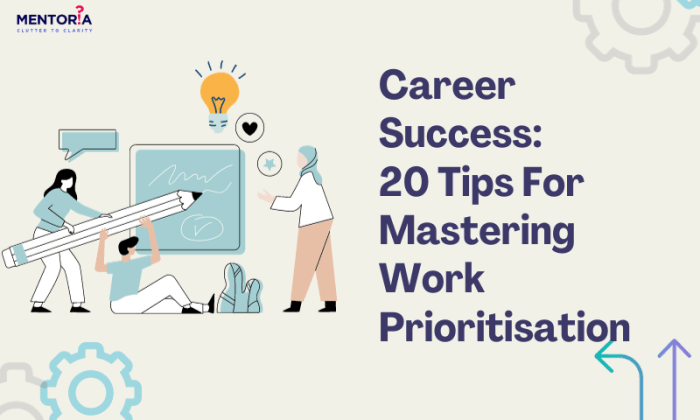
Think of your values as a compass guiding you through the twists and turns of your career journey. They’re your internal GPS, helping you navigate the choices that shape your professional path. Just like a compass points you north, your values help you steer towards fulfilling and meaningful work.
Using Your Values as a Compass
Your values are the non-negotiable principles that drive your actions and decisions. They act as your internal filter, helping you evaluate opportunities and make choices that align with what truly matters to you. For instance, if your value is creativity, you’ll gravitate towards roles that allow you to express your artistic side.
Yo, listen up! When you’re building your career, it’s all about aligning your hustle with what truly matters to you. It’s like, “What’s the point of chasing the big bucks if it ain’t gonna make you happy, right?” That’s where figuring out your values comes in.
And hey, if you’re thinking about launching your own startup, check out this awesome article on using Chat GPT to build your brand and strategy: Chat Your Way to Startup Success Building Your Brand and Strategy with Chat GPT.
It’s all about making sure your business reflects your personal values, so you can rock it out there and live your best life!
Similarly, if your value is work-life balance, you’ll prioritize jobs that offer flexible schedules and supportive environments.
Yo, wanna build a career that’s totally lit and reflects your true self? It’s all about aligning your values with your hustle, like a total boss. You gotta be true to yourself, and that means prioritizing what matters most to you.
Want some serious inspiration? Download And Listen Here to some epic stories that’ll fire you up to create a career that’s both fulfilling and successful. It’s all about finding your own path and rocking it!
Prioritizing Values Over External Pressures
In the hustle and bustle of career building, it’s easy to get swept away by external pressures and societal expectations. The “shoulds” and “oughts” can make you question your own values and lead you down a path that doesn’t feel authentic.
However, it’s crucial to prioritize your values over external pressures, even if it means going against the grain.
Unconventional Career Paths
Prioritizing your values can lead to unconventional career paths. Take, for example, a passionate environmentalist who chooses to pursue a career in sustainable agriculture instead of a high-paying job in finance. This decision aligns with their core value of environmental stewardship, even if it means taking a less traditional route.
You know, sometimes life throws you a curveball, like that time Trigger Burke got caught up in a whole mess of trouble. He’s the main character in the book Forty Steps to Old Sparky The Doom-fated Life of Trigger Burke , and let me tell you, his story is a wild ride.
It reminds me that when you’re making career decisions, it’s crucial to stick to your values and be true to yourself, just like Trigger should have done. Because when you’re living your truth, even if things get tough, you’ll always find your way back to the right path.
Similarly, an individual deeply valuing social justice might opt for a career in non-profit work, even if it involves lower salaries compared to other industries.
Book Review
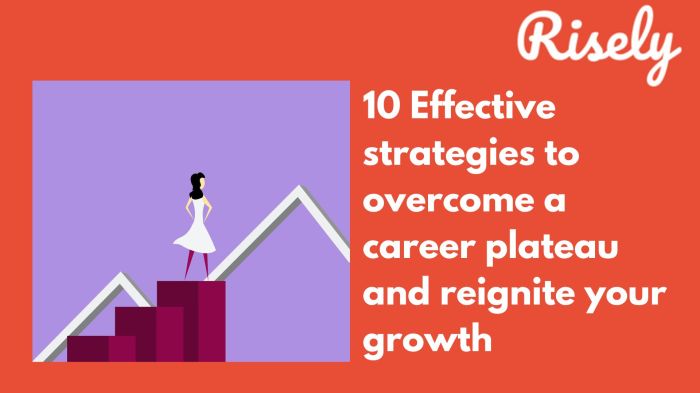
In a world where career paths are often dictated by societal expectations and the pursuit of financial security, finding a career that aligns with your values can feel like a daunting quest. Thankfully, “The 7 Habits of Highly Effective People” by Stephen Covey provides a framework for achieving both professional success and personal fulfillment.
Key Takeaways from “The 7 Habits of Highly Effective People”
Covey’s book emphasizes the importance of aligning your actions with your values, advocating for a holistic approach to career development. The book presents seven habits that, when practiced, can lead to a more fulfilling and purposeful career.
- Be Proactive:This habit encourages taking ownership of your career, rather than passively reacting to external factors. It emphasizes setting goals, taking initiative, and focusing on what you can control.
- Begin with the End in Mind:This habit encourages envisioning your ideal future and aligning your actions with your long-term goals. It emphasizes defining your values and priorities, and using them as guiding principles for your career choices.
- Put First Things First:This habit encourages prioritizing tasks based on their importance and urgency, rather than just their immediacy. It emphasizes focusing on your most important goals and values, and allocating your time and energy accordingly.
- Think Win-Win:This habit encourages seeking mutually beneficial solutions in your professional relationships. It emphasizes collaboration, compromise, and finding common ground, fostering a positive and productive work environment.
- Seek First to Understand, Then to Be Understood:This habit encourages active listening and empathy in communication. It emphasizes understanding others’ perspectives, building trust, and fostering meaningful connections.
- Synergize:This habit encourages working together to achieve greater results than what can be accomplished individually. It emphasizes collaboration, creativity, and leveraging diverse perspectives to achieve shared goals.
- Sharpen the Saw:This habit encourages continuous self-improvement and renewal. It emphasizes investing in your physical, mental, emotional, and spiritual well-being to maintain optimal performance and productivity.
Relevance to Crafting a Fulfilling Career
Covey’s principles offer a practical framework for aligning your career with your values. By prioritizing your values, you can make informed decisions about your career path, prioritize your work-life balance, and build meaningful relationships.
Comparison to Other Resources
Covey’s principles align with other resources that emphasize the importance of aligning your career with your values. For example, the “Ikigai” concept, which emphasizes finding your purpose at the intersection of what you love, what you’re good at, what the world needs, and what you can be paid for, resonates with Covey’s emphasis on finding a career that aligns with your values and strengths.
Ending Remarks
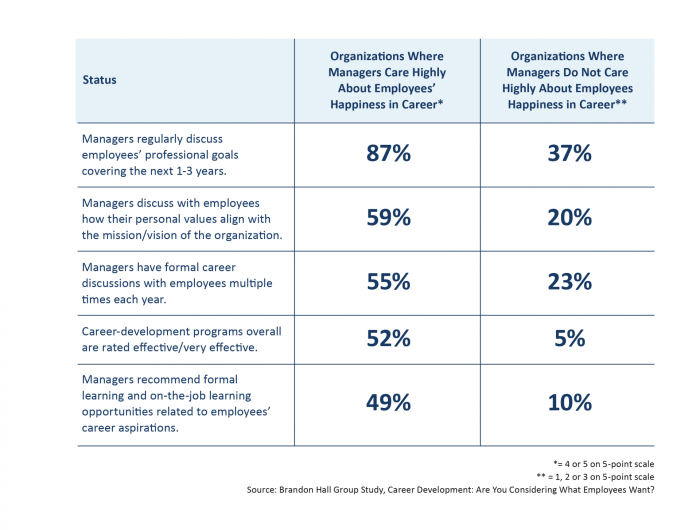
So, ditch the “shoulds” and the “have-tos.” This is your career, your life, your time to shine! By prioritizing your values, you’ll unlock a career path that’s not just a job, it’s a journey of purpose, fulfillment, and rockstar status.
Get ready to rock your career, one value at a time!
Popular Questions
What if my values change over time?
That’s totally normal! Your values can evolve as you grow and experience life. The key is to be aware of your evolving values and adjust your career path accordingly. It’s all about staying true to yourself, even as you change.
How do I find a job that aligns with my values?
Start by researching companies and organizations that share your values. Look for mission statements, company culture information, and employee testimonials. You can also network with people in your desired field to learn more about their experiences.
Is it okay to prioritize my values over making a lot of money?
Absolutely! Money is important, but it shouldn’t be the only factor in your career decisions. If you’re passionate about your work and aligned with your values, financial success will often follow. But remember, you can’t put a price tag on happiness and fulfillment.

